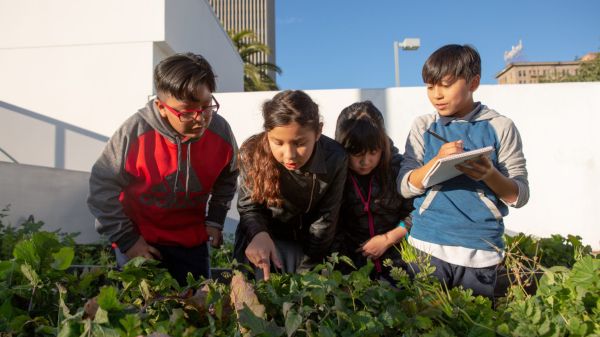Federal Bills Would Boost Environmental, Climate Education

The header photo is by Allison Shelley for EDUimages.
In the past couple of months, we have seen some exciting legislative proposals introduced into the 118th Congress that would have tremendous benefits for environmental and climate change education and mitigation. The No Child Left Inside Act and Living Schoolyards Act would provide much-needed funding to advance environmental literacy, support teacher professional development, and promote improvements to schoolyards for outdoor learning. Additional bills focused on sustainable schools and climate change education are pending and will hopefully be introduced later this year. Taken together, these initiatives would transform K–12 education, and go a long way toward making schools greener and healthier places to learn. We all need to get involved in supporting legislation that would make high-quality environmental and climate change education available to students in all public schools, particularly those most disproportionately affected by climate change.
The No Child Left Inside Act (NCLI)
This bipartisan bill would provide funding for states and school districts to implement environmental literacy plans, including teacher professional development. NCLI would also promote professional development for teachers on how to integrate environmental literacy and field experiences into their instruction and establish competitive grants to help schools partner with state and local agencies, colleges, and nonprofits to expand research-based practices in outdoor education. It also includes a national pilot program for outdoor school for all models.
Living Schoolyards Act
The Living Schoolyards Act would establish an Outdoor Learning Spaces Grant program, administered by the U.S. Department of Education, to allow schools or districts to create outdoor classrooms and learning spaces. Schools would be able to receive planning or implementation grants, depending on their needs. In addition to equipment and installation for outdoor classroom spaces, funds can be used to support teacher professional development to improve their ability to effectively use outdoor spaces for learning.
Other bills—including the Green Ribbon Schools Act which would expand and resource U.S. Department of Education’s green schools program and a Climate Change Education Act to establish a grant program within NOAA’s Office of Education—may be introduced later this year.
Stay tuned on NCLI, the Living Schoolyards Act, and other environmental and climate education policy and advocacy work by subscribing to eeADVOCATE >

